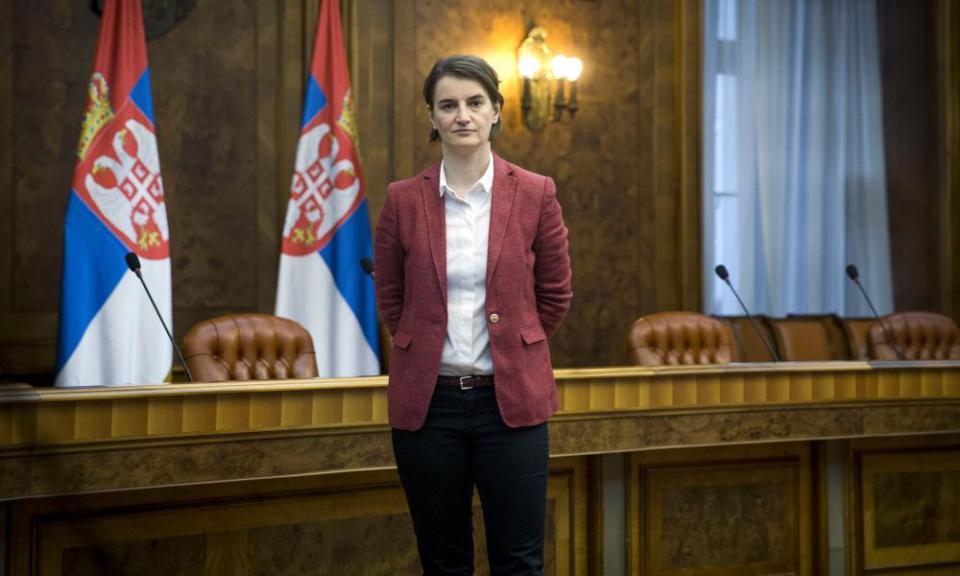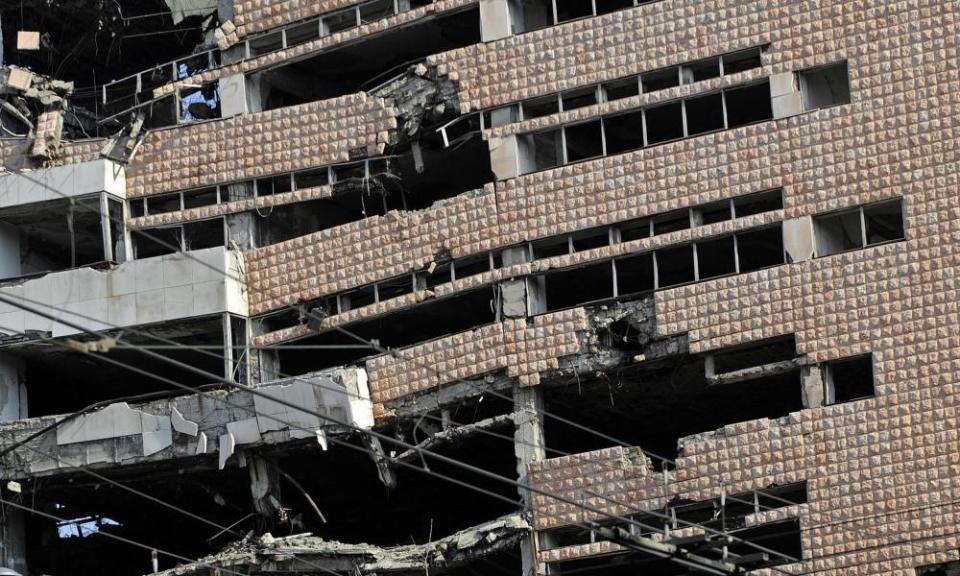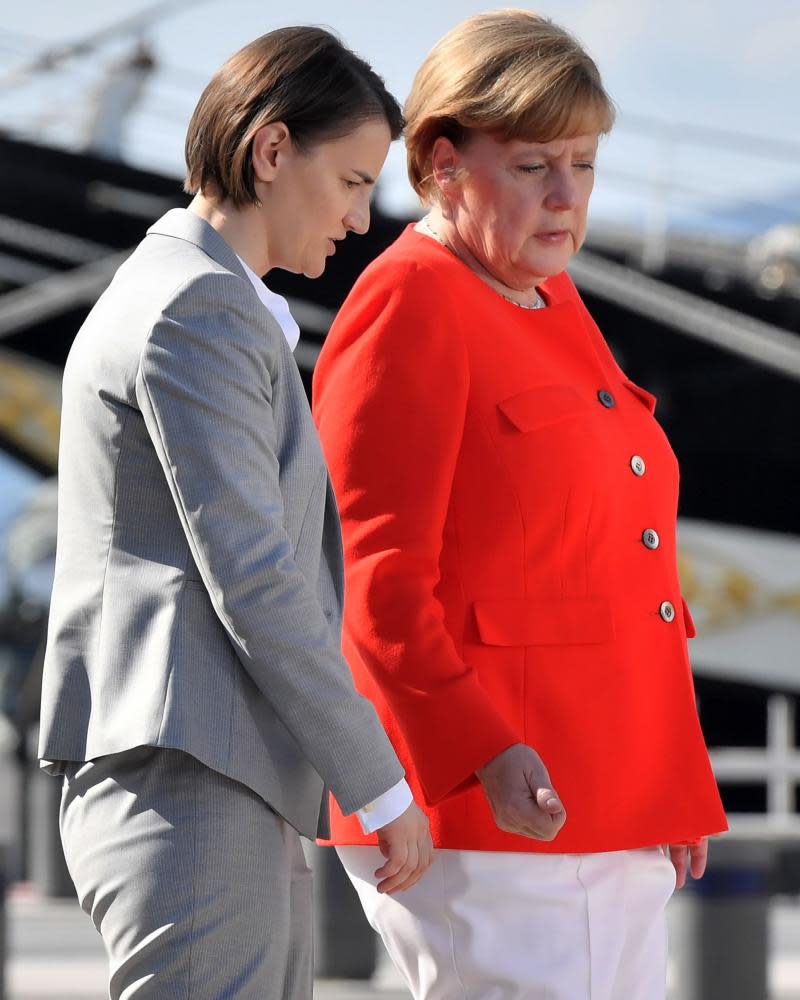Ana Brnabić: 'I do not want to be branded Serbia's gay PM'

The appointment of Ana Brnabić as Serbia’s prime minister aged 41 was accompanied by the sound of glass ceilings being shattered all around her.
Not only is she the first woman to take on the role, Brnabić is gay and has achieved high office without being a member of a political party.
Giving her first interview to a foreign newspaper after a month in the job, she said: “Serbia is changing and changing fast, and if you will, I am part of that change, but I do not want to be branded ‘Serbia’s gay PM’. The message we need to send is about competence, professionalism and trustworthiness.”
Brnabić is dedicated to transforming the image and reality of Serbia, working punishing hours with a largely young team on administrative reforms to prepare it for eventual EU membership. “We are a country that does not have time to lose,” she said.
Brnabić was plucked from relative obscurity to become the public administration minister in August 2016 by the then prime minister, Aleksandar Vučić. After Vučić was elected president eight months later, he chose her to succeed him.
She had little hands-on experience of Serbia’s unforgiving politics before becoming prime minister, a role that brings with it an imposing security detail outside her private office in Belgrade. In 2003 the then prime minister, Zoran Đinđić, was assassinated by an organised crime gang.
In her early 20s Brnabić spent six years abroad, mainly in London, from where she watched on TV as Nato planes bombed the defence ministry in Belgrade in 1999. To this day the buildings, over the road from her spartan office block, are a shell, a reminder of Serbia’s loss of Kosovo. They also highlight the dangers facing the Balkans as the west and Russia fight for strategic advantage.

Brnabić returned to Serbia 16 years ago after a master’s at Hull University to be an aunt to her sister’s children and pursue a private business career, but she said she had always been political.
She is determined not to make a point of her gender or sexuality, at least for now. Although as a gay Serbian citizen she cannot marry, Brnabić said she did not plan to push LGBT legal reforms at this stage.
“The reason why I am not focused on that now is because I deeply, truly believe Serbia will be a more tolerant society once people have jobs, better paid jobs, don’t have to care about their own livelihood, or the future of their own children, and do not have to worry about two or three generations living in the same flat,” she said.
“I don’t think Serbia is that homophobic. I know that is one of the perceptions, and I understand attitudes are different in parts of Serbia. But some journalists were in a village in central Serbia where part of my family come from. They saw a couple of people just drinking beer in front of the local store and they asked them about me, and they replied: ‘Well, listen, in this part of Serbia we grow raspberries, fruit and vegetables, and we do not grow discrimination.’
“We just need to hear these kinds of people as well. The citizens of Serbia have a right not to be portrayed by a loud minority. We can have a culture where we disagree, as long as there is tolerance and no violence. We all have different views and values, but I don’t want to change people’s thinking by law.”

Her detractors – and she admitted that some of the Serbian press could be brutal – claim that her sexuality is designed to hide the truth that Vučić still runs the country, and it remains a largely authoritarian, corrupt state, riven by ethnic rivalries.
The charge is that Vučić, who started his career as an ultranationalist minister of information in the Slobodan Milošević era, is keen to show the west that Serbia is changing and so improve its dwindling chances of EU accession.
Brnabić insisted that the president was anything but a micromanager, and said he gave her only broad advice such as “focus on a limited number of issues, don’t spread out, avoid useless meetings, leave time to think and move fast.”
In conversation, Brnabić is smart, pragmatic and agile. Given Serbia’s delicate balancing act between Europe and Russia, she needs to be.
She has argued that Serbia’s strategic goal is to achieve EU membership, but said this does not require abandoning the traditional friendship with Russia. “Without any shadow of doubt, the EU is where we are going. Our relationship with Russia is deep, it is historically deep, it is in our tradition and in our religion … We have never been asked to choose either or,” she said.
In a sign of her commitment to the EU, Brnabić has established a government department dedicated to European integration and another focused on the environment. “Environment protection is going to be the one of most difficult and certainly the most expensive chapter in our EU accession,” she said.
Accession negotiations formally began in 2014, but many Serbs are losing faith in the process and remain emotionally committed to Russia. Brnabić said polls showed support was recovering and many Serbs recognised that the reforms required to prepare the country for EU membership were necessary in themselves. “Joining the European community of nations is the icing on the cake, but the journey is just as important,” she said.
“We spent the first three years focusing on the economy, mostly turning the Titanic away from the iceberg of bankruptcy.” Administrative changes and, crucially, reforms to the rule of law are next. “If we do not have rule of law and effective and transparent judiciary, everything else will start crumbling down,” she said.
It is early days and Brnabić may yet fail to change Serbia, but for the moment it is an experiment worth watching.

 Yahoo News
Yahoo News 